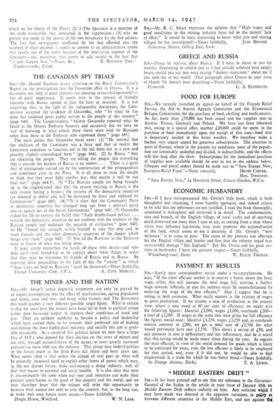THE MINER AND THE NATION
Sta,—Mr. Smart's rather dogmatic statements can only be proved by an expert investigation into the effect of mechanisation, ageing population and mines, wear and tear, and many other factors, and The Economist this week reaches a very different possible target figure. What is certain is that for years past the miners have been led to look to political action rather than increased output to improve their conditions of work and pay. They are unlikely suddenly to forsake a policy and leadership which have carried them so far towards their professed aim of making coal-mining the most highly-paid industry, and socially this aim is prob- ably reasonable. As a result of this political action we now have a large bloc of M.P.s who depend for their election on the votes of miners and are able, through nationalisation of the mines, to exert greatly increased pressure on those who run the industry. This group may bedevil politics in the future much as the Irish Party did thirty and forty years ago. What seems clear is that unless the outm of coal goes up there will be generally increased need to exploit other- forms of power which may, in the not distant future, make coal-mining a dying industry, with all that that means in personal and social trouble. It is also clear that now Is pre-eminently the time when our vast coal resources can make their greatest contribution to the good of this country and the world, and we may therefore hope that the miners will seize this opportunity to Increase their output not only to save the country, but, in the long run, to make their own future more secure.—Yours faithfully,


































 Previous page
Previous page